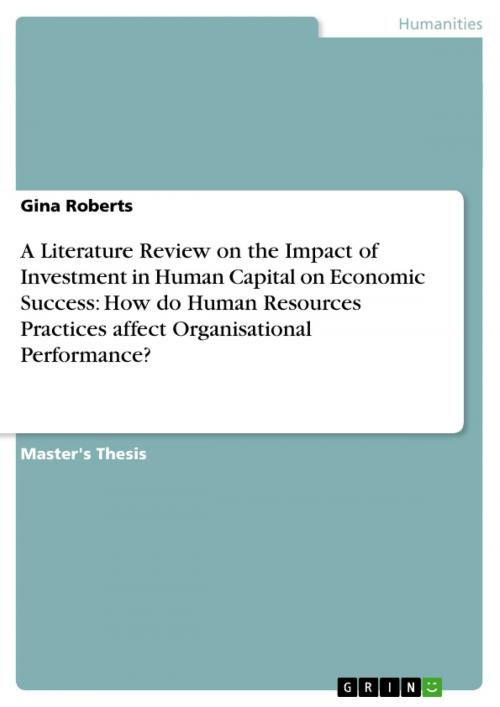A Literature Review on the Impact of Investment in Human Capital on Economic Success: How do Human Resources Practices affect Organisational Performance?
Nonfiction, Health & Well Being, Psychology, Occupational & Industrial Psychology| Author: | Gina Roberts | ISBN: | 9783638318709 |
| Publisher: | GRIN Publishing | Publication: | October 25, 2004 |
| Imprint: | GRIN Publishing | Language: | English |
| Author: | Gina Roberts |
| ISBN: | 9783638318709 |
| Publisher: | GRIN Publishing |
| Publication: | October 25, 2004 |
| Imprint: | GRIN Publishing |
| Language: | English |
Master's Thesis from the year 2004 in the subject Psychology - Work, Business, Organisational and Economic Psychology, grade: 1,0 (A), LMU Munich, 46 entries in the bibliography, language: English, abstract: [...] For companies to gain desired productivity increases from the introduction of advanced and complex technologies, they require a workforce with the necessary skills and knowledge to use them. Thus the value of formal education, technical schooling and on the job training has increased in societies where significant economic growth has been achieved through major advances in technical knowledge (Becker, 2002). This is not to say that Human Capital is not important for developing countries and emerging economies. On the contrary, returns to education, particularly for elementary schooling have been found to be even higher in developing countries (Jones, 2001). Companies realised from the 1990s onwards that the Human Capital within their organisations could be utilised as source of competitive advantage that adds economic value to the firm. In today's knowledge economy, the people that make up an organisation are seen as wealth and capability generators who can profoundly affect market appeal, reputation and performance (Rylatt, 2003). The potential economic significance of HRM has been increased by strategically fitting HRM practices with business strategy. HR communicates the strategic direction of the organisation to employees and defines and transmits organisational culture that supports organisational objectives by signalling the desired corresponding employee attitudes, behaviours, motivational and affective responses (Ostroff & Bowen, 2000). The research question posed in this thesis takes on the challenge to find empirical evidence that investment in human capital has a positive impact on intermediate as well as accounting and sharevalue economic (bottom-line) indicators of organisational performance, both directly and indirectly. This literature review summarises, integrates and evaluates research published between 1998 and 2003 pertaining to the impact of Human Resources on indicators of employee and firm performance. The articles reviewed here are not exclusive to organisational/industrial psychology but also contribute to the discourse taking place in the domains of business administration and economics. This thesis is, therefore, of interest to academics and professionals working in the domains of organisational/industrial psychology, business administration, economics, human resources, management consulting and strategy.
Master's Thesis from the year 2004 in the subject Psychology - Work, Business, Organisational and Economic Psychology, grade: 1,0 (A), LMU Munich, 46 entries in the bibliography, language: English, abstract: [...] For companies to gain desired productivity increases from the introduction of advanced and complex technologies, they require a workforce with the necessary skills and knowledge to use them. Thus the value of formal education, technical schooling and on the job training has increased in societies where significant economic growth has been achieved through major advances in technical knowledge (Becker, 2002). This is not to say that Human Capital is not important for developing countries and emerging economies. On the contrary, returns to education, particularly for elementary schooling have been found to be even higher in developing countries (Jones, 2001). Companies realised from the 1990s onwards that the Human Capital within their organisations could be utilised as source of competitive advantage that adds economic value to the firm. In today's knowledge economy, the people that make up an organisation are seen as wealth and capability generators who can profoundly affect market appeal, reputation and performance (Rylatt, 2003). The potential economic significance of HRM has been increased by strategically fitting HRM practices with business strategy. HR communicates the strategic direction of the organisation to employees and defines and transmits organisational culture that supports organisational objectives by signalling the desired corresponding employee attitudes, behaviours, motivational and affective responses (Ostroff & Bowen, 2000). The research question posed in this thesis takes on the challenge to find empirical evidence that investment in human capital has a positive impact on intermediate as well as accounting and sharevalue economic (bottom-line) indicators of organisational performance, both directly and indirectly. This literature review summarises, integrates and evaluates research published between 1998 and 2003 pertaining to the impact of Human Resources on indicators of employee and firm performance. The articles reviewed here are not exclusive to organisational/industrial psychology but also contribute to the discourse taking place in the domains of business administration and economics. This thesis is, therefore, of interest to academics and professionals working in the domains of organisational/industrial psychology, business administration, economics, human resources, management consulting and strategy.















